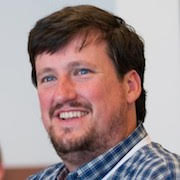
Dennis Pillion was covering sports for the Alabama Media Group in 2010 when the Deepwater Horizon spill dumped millions of gallons of oil into the Gulf of Mexico. His editor immediately dispatched him to the Gulf shore to report on the oil spill heading their way – the largest marine spill in U.S. history.
“What was really striking to me was the human impact, how deeply people in the region were affected,” said Pillion, a 2015 alumnus of Metcalf’s Annual Science Immersion Workshop for Journalists. “On a personal level, it was just scary because of the uncertainty, the experience of witnessing something that has never happened before.”
Following the spill, he returned to the sports desk for a short time before being promoted to beaches reporter. An Eagle Scout who spent his childhood canoeing, kayaking, and backpacking in the Alabama wilderness, Pillion said his new beat brought him closer to what he really wanted to do – environmental reporting.
“I’ve always felt a great connection with the outdoors and a sense of personal responsibility about the decisions I make and the impact of those decisions on the larger environment,” said Pillion.
Pillion’s goal of becoming a full-time environmental reporter led him to apply for Metcalf’s Annual Workshop, where he valued the opportunity to interact with scientists and spend time with other reporters already working in the field.
Pillion described “learning how to comb through scientific literature to extract the meaning and most relevant information for news audiences” as one of the most helpful skills gained from the Metcalf Annual Workshop. “It’s always challenging to take a scientific topic and find the most interesting information for your audience without sensationalizing it, making false claims about it, or stating that the study goes further than it really does.”
Pillion returned to Alabama with new science and investigative skills, which he has applied to a new full-time position as the Alabama Media Group’s natural resources reporter. He now covers everything from land conservation, wildlife, pollution, and energy to water quality and the impact of state budget cuts on Alabama’s Department of Environmental Management. The latter, according to Pillion, comes with the additional challenge of getting people to understand how those budget cuts impact their lives.
“It’s hard to take something like a water pollution permit and boil it down to something that really affects the reader,” said Pillion. “I have to identify connections through concrete examples that people can see, feel, and taste, making them appreciate the situation immediately,” said Pillion.
Five months into his expanded environmental beat, Pillion believes he’s seeing things with a fresh eye, and he’s excited about the stories yet to be told.
“The best stories are the ones where I learn something, so hopefully I’ll keep writing those stories and learning.”
Read More Alumni Profiles